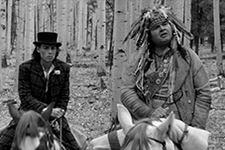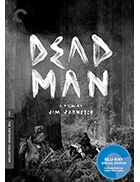Dead Man
|  Dead Man, Jim Jarmusch’s fifth feature, was also the idiosyncratic indie auteur’s first genre film—or, should I say, first anti-genre film—and, to date, his only film set in the past. A classical Western in terms of its iconographic elements, Dead Man exists primarily to undercut the values, ideals, and expectations of that most cherished of classical American genres, reveling in the filth, blood, grime, and desolation of the conquered West before setting out on an existential, perhaps metaphysical, journey to the verdant Pacific Northwest. If that doesn’t sound like much fun, it isn’t, at least in a literal sense, although it’s hard not to admire Jarmusch’s sense of generic transgression while still keeping true to his own poetic sensibilities. The story opens with the titular character dead man, a mild-manner accountant named William Blake (Johnny Depp), who spends the film’s lengthy (some might say interminable) opening minutes riding on a train from Cleveland, Ohio, to Machine, a small, dingy frontier town somewhere in the desert Southwest. Having recently lost his parents and sold all his possessions, he is a young man going West to claim an accounting job at Dickinson Metalworks, a smoke-churning, iron-clanging outpost of ruthless capitalism that appears to be the sole reason for the town’s sordid existence. One might suspect that the lengthy opening sequence on the train was designed primarily to alert viewers to what is to come, just in case anyone wandered in expecting a traditional Western, rather than Jarmusch’s black-and-white existential noodling in that genre’s fabled terrain scored entirely by the raucous power chords of Neil Young’s electric guitar. Jarmusch has a way with time and taking his time, and he loves nothing more than eccentric, oddball, unsettling, or otherwise intriguing characters doing their own thing, which is why a significant portion of the opening sequence involves Blake talking with the train’s soot-covered fireman (Crispin Glover). Certain important narrative information is dispensed in their dialogue, sure, but I also suspect that Jarmusch just liked the wonderfully odd visual and tonal conflict between Depp’s button-down, bespectacled reserve and Glover’s blackface weirdness. When Blake arrives in Machine, he discovers that his job has already been given to someone else, which leaves him literally stranded in the desert. A chance encounter with a woman named Thel (Mili Avital) and later her violent paramour Charlie (Gabriel Byrne) result in Blake getting a bullet in his chest and his face plastered on a wanted poster for murder. His would-be employer, the vicious, cigar-chomping tycoon John Dickinson (Robert Mitchum, in his last screen appearance), becomes his hunter, hiring a gang of mercenaries led by Cole Wilson (Lance Henriksen) to track him down and bring him back dead or alive. Blake finds an unlike ally in Nobody (Gary Farmer), a portly Native American who has been outcast because his mother and father were from different tribes (Blackfoot and Crow) and now wanders the countryside with no particular aim. While Nobody at first dismisses Blake as yet another “stupid fucking white man,” he changes his tune when he learns his name and becomes convinced that he is the reincarnation of the mystical poet and painter William Blake, which Nobody, of course, can quote by heart (the film is a literary geek’s cornucopia of allusions to Blake’s art, from imagery, to character names, to lines of dialogue). That is pretty much the plot, and while much of it is quite conventional by Jarmusch’s standards, it nevertheless maintains his typical anti-narrative approach that privileges character over story and, in this case, mysticism over reality. With the bullet in his chest, Blake is essentially a dead man (or, perhaps, already a dead man) moving slowly toward his imminent demise, but not before he comes across all manner of oddball characters lurking in the margins of the Old West, including a band of outlaws led by a cross-dresser named Salvatore “Sally” Jenko (Iggy Pop). Depp, who was at the height of his eccentric indie character-actor stardom, having recently appeared in Benny & Joon (1993), What’s Eating Gilbert Grape? (1993), Ed Wood (1994), and Don Juan DeMarco (1995), makes for a compelling central character who undergoes a rather astonishing transformation from bumbling, introverted victim, to unfairly accused killer, to actual killer, to transcendent subject. His interactions with Farmer’s Nobody, a character that is designed to undermine all the stereotypes and clichés associated with Indians in the Western, are both humorous and increasingly touching, even if their conversations often verge into the abstract or the absurd. Working again with German cinematographer Robby Müller, who previous shot Down by Law (1986) and Mystery Train (1989), Jarmusch turns the film’s various landscapes into an evocative dreamworld that feels like an Ansel Adams photo in motion. The high-contrast black-and-white cinematography has the effect of rendering the familiar—forest, mountains, rivers—downright otherworldly, which underscores the film’s spiritual dimension and deep distrust of the destructive nature of humankind. Unlike Jarmusch’s previous films, Dead Man is violent—graphically, at times shockingly so—which stands in stark contrast to the moody beauty of the world in which the blood is shed. It’s not always a particularly pleasant experience, but Dead Man is a singular piece of generic transgression, making the unmaking of the West—something that filmmakers had been doing to various degrees for decades—feel shockingly, aggressively, and poetically new.
Copyright © 2018 James Kendrick Thoughts? E-mail James Kendrick All images copyright © The Criterion Collection | |||||||||||||||||||||||||||||||
Overall Rating: 


 (3.5)
(3.5)


